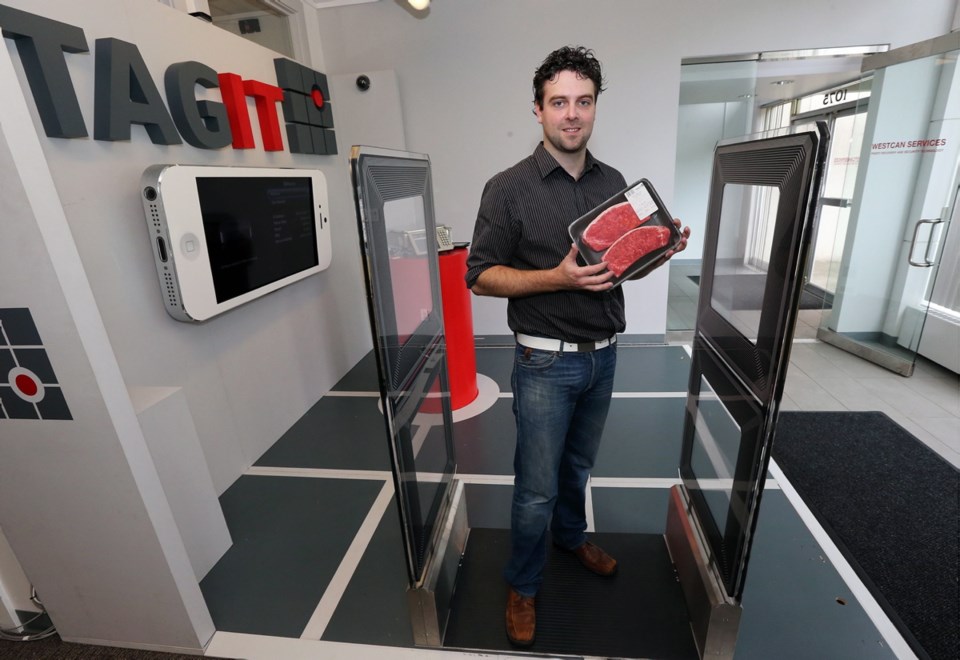Nolan Wheeler is waging a battle against grocery store shoplifting, but his biggest hurdle may not be nailing would-be thieves. It could be persuading slightly jaded retailers that a solution is at hand.
Wheeler founded Westcan Services, which specializes in profit recovery for retailers. He said seasoned veterans in the industry have been burned so many times by security solutions that don’t work, many are loath to even hear a sales pitch.
“There’s a lot of scar tissue out there,” said Wheeler, who recently established the North American arm of Tagit, a new electronic article surveillance system (EAS) he hopes will start changing their minds. “This is not [an easy sell]. It’s a real battle.”
The Tagit system, developed in Europe but augmented by Wheeler for the North American grocery market, works with electromagnetic stripes imbedded in price tags. Meat and cheese labels are a particular focus, given that they are some of the most stolen items, according to the Global Retail Theft Barometer. Some retailers also tag high-risk items like health and beauty aids.
If the stripes are not deactivated at the point of sale, protected items will set off alarms as would-be thieves pass through a security gate on their way out of a store.
It sounds simple enough — and it sounds like a lot of other systems that have gone before, which is a problem.
Wheeler said most of those systems now in place are easily cracked. Many similar tags fail to set off alarms when they pass through security gates.
Wheeler said Tagit is different. He said it is robust enough to solve some of the biggest problems EAS systems have had: Tags can be tampered with, rendering them useless, many won’t work in metal shopping carts or baskets, and some can be defeated by some heavily lined shopping bags. “We’ve had to get past the preconceived notions of EAS,” he said.
The Tagit system also can be integrated with cameras that will send videos of would-be thieves to smartphones within seconds of an incident.
“You can see the reaction of a person, where they came from in the store, what they are wearing and the direction they went,” said Wheeler, noting that it makes the interaction with a suspected thief more fruitful, given there’s accessible and immediate proof. “Also, if you have good video of people stealing, the police are incredibly supportive.”
Wheeler said the cost of the system — about $10,000 per door, plus the ongoing cost of the enhanced price tag — could be recouped within a fiscal quarter by a “reasonably decent-volume grocery store.” He said the system will work for any kind of retailer.
Figures from the Global Retail Theft Barometer, conducted by the U.K.-based Centre for Retail Research, suggest retail loss is a massive problem.
According to the survey, the loss experienced by retailers from shoplifting, employee theft and administrative errors amounted to $120 billion globally in 2011, and totalled $45 billion in North America.
Vic Lum is only too well aware of the problem.
The owner of Wellburn’s grocery store on Cook Street said shoplifting had become a huge problem, prompting him to try Tagit.
“It’s worked good here. As a deterrent for shoplifters, it’s definitely worked for us,” he said, adding that since the system was put in place this year, he has seen a change in his clientele. “Definitely, the number of street people is less — those who have come through and set it off, we don’t see them back again.”
Lum said that’s down to a combination of the Tagit system and the work of security staff. He added that when word gets around, thieves tend to stay away.
“The only problem we have had are false alarms. It’s almost too sensitive [a system],” Lum said, though he suggested that false alarms are as much due to staff forgetting to deactivate items as the sensitivity of the system.
The other local stores with Tagit in place are Fairway Markets.
“Can I fix the problem of theft? No,” said Wheeler, noting that career criminals are going to steal somewhere. “But for a retailer, I can fix their problem. I can get [thieves] to move on and steal somewhere else.”



